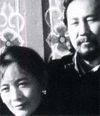First a dislosure of bias: I could watch a good documentary film about anything. There's a beautiful mystery to life that plays out, paradoxically, in a mundane tick-tock of events that a documentary captures in raw poetry. Therefore, if a fiction film has the verisimilitude of a documentary, I will watch it hungrily.
Which is why I liked "A Mongolian Tale" so much. It's a fine and touching love story. It's got beautiful scenery, about which more in a moment. The acting is pure and flawless. But best of all, for me, is it's documentary feel. I am transfixed by the challenge of understanding China, and when a book or a film comes along that delivers not only a slice of life in China but the emotional textures underneath it -- how it felt to live through that experience of life -- I'm hooked.
Anger and Shame
The story is simplicity itself. A young boy and girl grow up together, with their doting granny, in the remote grasslands of Inner Mongolia. They're home is a yurt, the distinctive round tent that can be pitched or struck in minutes according to the weather. The long, gentle arc of the film's story is of the young boy, Bayinbulag, who in his early teens gets a chance to get training as a veterinarian in a faraway city. He takes it, but comes back four years later to marry the young girl, Somiya, he's left behind.
 She has waited for him devotedly through years one, two, three and most of four. But she finally weakened and became pregnant by another man. She still wants to marry Bayinbulag, but he cannot win out over his anger and shame, and flees back to the city.
She has waited for him devotedly through years one, two, three and most of four. But she finally weakened and became pregnant by another man. She still wants to marry Bayinbulag, but he cannot win out over his anger and shame, and flees back to the city.
Many years later he returns again to visit Somiya, who by now has married and has a clutch of bare-bottomed kids scampering around on the Mongolian grassland. In a few stolen moments of privacy, during which the husband is sleeping off a drunk, they exchange bittersweet words that seek but do not quite bring closure to their own doomed romance.
Empty Grasslands
The love story is universal and moving; the film's verisimilitude tells a very particular story that many young Mongolians have lived in the past thirty years. That story is of of a big city pulsing far away from the empty grasslands, drawing the young Mongolian men away in search of jobs and money, and then returning them years later as entirely changed creatures bearing witness to a lost way of life.
 Directed by Xie Fie, also known for Women from the Lake of Scented Souls, and The Sun on the Roof of the World, A Mongolian Tale is based on the novel Black Steed by
Zhang Cheng-zhi. The young women is played by the Mongolian actress Narenhua, and the young man by the actor Tengger. I don't know if the woman who played the grandmother, Nai Nai, is a professional actress or not, but I wouldn't be suprised if not. She does a madwoman-on-the-grasslands turn towards the end of the film, keening for the boy that she lost to the big city, and in her senility recalling the paradise she had when she was a young woman on the steppes.
Directed by Xie Fie, also known for Women from the Lake of Scented Souls, and The Sun on the Roof of the World, A Mongolian Tale is based on the novel Black Steed by
Zhang Cheng-zhi. The young women is played by the Mongolian actress Narenhua, and the young man by the actor Tengger. I don't know if the woman who played the grandmother, Nai Nai, is a professional actress or not, but I wouldn't be suprised if not. She does a madwoman-on-the-grasslands turn towards the end of the film, keening for the boy that she lost to the big city, and in her senility recalling the paradise she had when she was a young woman on the steppes.
This allows us perhaps to feel, if fleetingly, what many Mongolians have felt once touched by the transformations wrought by contact with the modern world.
To reach Douglas C. McGill: dmcgill@virtualchina.com

